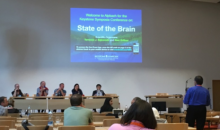
The “State of the Brain” Keystone Symposium offered a platform for investigators and funding groups to share their current scientific discoveries and discuss new and exciting future brain-related research….
In May, scientists from around the world met at the Alpbach Congress Centrum in Alpbach, Austria to discuss The State of the Brain, one of the Keystone Symposia on Molecular and Cellular Biology. The conference commenced with a keynote address by Dr. Cornelia Bargmann (Rockefeller University), a past-member of the BRAIN Working Group to the Advisory Committee to the NIH Director and current member of the NIH BRAIN Multi-Council Working Group (MCWG). Dr. Bargmann noted that “we don’t have [scientific] competition in BRAIN – our competition is ignorance,” later reminding the group that new collaborative and cooperative environments can provide unique opportunities to greatly accelerate progress in brain science.
Major national research programs across the globe are bringing together neuroscientists, engineers and other experts to drive the development of novel technologies for studying neural networks and to create new ways of sharing large sets of data. At The State of the Brain, NINDS Director Dr. Walter Koroshetz explained the US BRAIN Initiative’s currently funded projects and future plans. Dr. Felix Schuermann mapped out the European Union Human Brain Project, a 10-year endeavor for generating a framework of knowledge about the mammalian brain and ultimately the human brain. Dr. Christof Koch discussed the The Allen Institute for Brain Science’s open-access brain atlases and plans to characterize the morphology, electrophysiology, and transcriptome of cell types and their synaptic interconnections. Dr. Mu-ming Poo shared the China Brain Science Project’s vision and focus with a major focus on research in macaques to understand the neural basis of cognition, as well as the immediate need for early detection of major brain diseases. Dr. Hideyuki Okano (Japan Brain/MINDS; Brain Mapping by Integrated Neurotechnologies for Disease Studies) revealed data from marmoset transgenic models of neurodegenerative diseases, as well as plans for brain mapping studies based on marmoset research and extension to human brain mapping and clinical research.

Dialogues on the International Brain Projects set the stage for exciting presentations by distinguished investigators, as well as talented postdoctoral fellows, in several disciplines of neuroscience. Topics included:
- identifying cell types in the brain;
- large-scale monitoring and manipulating neurons;
- generating multi-scale neural circuits;
- understanding human brain function and dysfunction;
- computational modeling;
- using genetics to deconstruct neural circuits;
- and analyzing high-dimensional brain datasets.
Reported findings stemmed from model systems spanning the lamprey and zebrafish, to mice and monkeys, and even human clinical research, incorporating techniques ranging from single cell sequencing, two-photon calcium imaging, and optoencephalography, to electrophysiological recordings, brain computer interfaces, and more. Several NIH BRAIN Initiative awardees explained their current work, including Dr. Florian Engert from Harvard University, Dr. Mark Schnitzer from Stanford University, and Dr. Hongkui Zeng from the Allen Institute for Brain Science.
Discussions of how the worldwide neuroscience community might organize and build useful collaborations in order to advance our understanding of the brain permeated the conference. It is apparent that enormous advances will be made within the coming years, and the goal is that these advances will ultimately lead to knowledge of the human brain’s intricacies and an ability to reduce the burden of neurological disorders and diseases. For more information on this meeting, co-sponsored by Drs. Terrence Sejnowski (UC San Diego) and Sten Grillner (Karolinska Institute), please visit: The State of the Brain Keystone Symposia.
